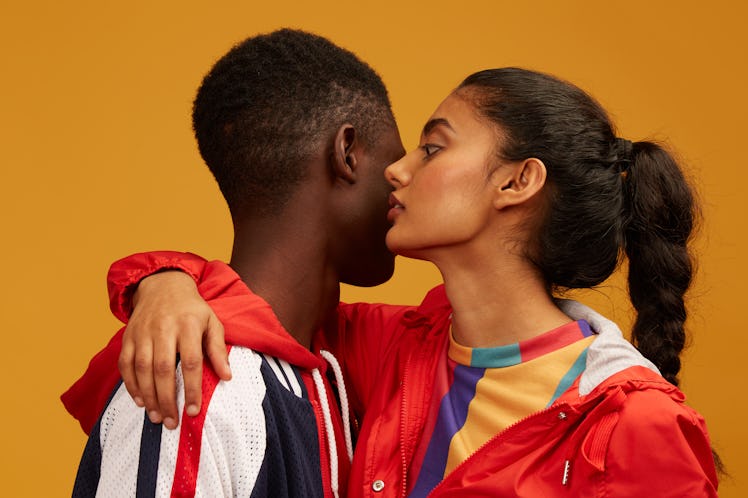
Here's What To Do When Your Partner Accidentally Does Something To Make You Sad
I learned two things at summer camp — macrame and the rule of Ouch Oops, a communication tactic used when someone hurts your feelings by accident. While my camp days are long gone, when your partner accidentally does something to make you sad, having a low-key and timely way to express your feelings can take the pressure off of big "talks," and keep big resentment from building up. Smaller, more frequent mentions when something hurtful happens (Ouch) and immediate validation and an apology (Oops) can be an effective way to express your feelings when you did not mean to be hurtful.
"One of the biggest mistakes in relationships is the avoidance of direct conversation with the hopes of not creating conflict," Dr. Joshua Klapow, Ph.D., clinical psychologist and host of “The Kurre and Klapow Show” tells Elite Daily. "When you partner hurts your feelings there is no reason (at all) to not let them know in an honest, calm manner. If your partner has hurt your feelings they should and often do want to know."
If you can express when you're in pain, and be specific about what hurts, you and your boo may learn to communicate in a way that's best for both of you. I spoke with Dr. Klapow about the accidental ouches, and the best ways to say "I'm sorry."
Know If The Pain Is Intentional Or Accidental
An important part of understanding why your partner upset you, is knowing if they meant to. It can be easy to misread a text or hear a meant-to-be-joke as a hurtful dig. Checking in with how you communicate with your boo can shine some light on your current feels.
"The foundation of your relationship and the past episodes of hurt feelings will determine if they purposefully or accidentally hurt your feelings this time," Klapow says. "Have they hurt you purposefully in the past? Do they 'own' the mistake or do they try and pass it off as your fault? The more apologetic, the calmer and concerned they are the more likely it is to be accidental. The more defensive, the more protesting, the more twisting of the truth, the more likely it was at least partly on purpose."
If your partner can calmly express their intentions, it could mean they weren't trying to be mean. Saying sorry, and taking steps to be more mindful in the future like, I won't joke about that anymore or I'll let you know when I'm running late in the future, can help ease the ouch.
Know When To Accept An Apology, And When To Ask For More
If it's clear that your boo didn't mean to hurt you, it may be helpful to accept their apologies and try to move on. If you're not sure the source of the pain, and you think bae was trying to hurt your feelings — it may be time for a talk.
"When they accidentally hurt your feelings, the key to being able to move on and forgive is in their response," Klapow says. "If they are apologetic, if they are authentic in their communication, if they communicate their feelings for you and that it was not something they intended to do, if they generate a plan for not repeating the mistake again, then if you believe them, while your feelings may be hurt, you should be able to move forward."
Moreover, it could be help your healing to have your boo establish ways that they are going to modify their behavior in the future.
Notice When "I Didn't Mean It" Becomes A Pattern
If your partner keeps doing that thing that they know hurts your feelings, it can be hard to hear "I didn't mean it" again and again. Cue 2001 Degrassi Craig and Ashley. I'm sorry. I'm sorry, I'm sorry, I'm sorry. How many times do I have to say it? Maybe they always forget to call when they get off work, or they keep forgetting to introduce you when you're both at a party. When it keeps happening, it can be hard to tell if it really is an accident.
"Partners can absolutely hurt repeatedly on accident. Whether it’s criticism that is coming from a place of good intentions but poor delivery, partners can repeatedly engage in behaviors that hurt even when they are not trying to," Klapow says. "This is why it is imperative that you communicate about the particular actions hurting you. The longer you don’t address it, the more the pattern can become ingrained."
The best way to handle an "ouch" moment is by expressing when you're in pain, and explaining why it hurts. Your boo continuing to hurt your feelings doesn't mean that they're necessarily trying to be painful. Try speaking to them in different ways about how you're feeling. They could think you're kidding and are not truly upset, or they could be fuzzy on what they're doing wrong, and unsure how to fix it. The best way to ensure good feelings all around is to open lines of communication and try to be as specific as possible.
From a joke gone bad to forgetting to pick you up at the train station, there are a lot of reasons why your partner might have accidentally made you sad. If you're feeling bummed, talk to your boo about how what you're thinking. If you're noticing a pattern in ouchie behavior, it may be time to set some clear boundaries and #relationshipgoals to work on. Everyone makes mistakes, and with a little communication and care, you can work through these problems. But if the pain continues, know that it's OK to walk away from a relationship that no longer serves you — because you deserve the best.